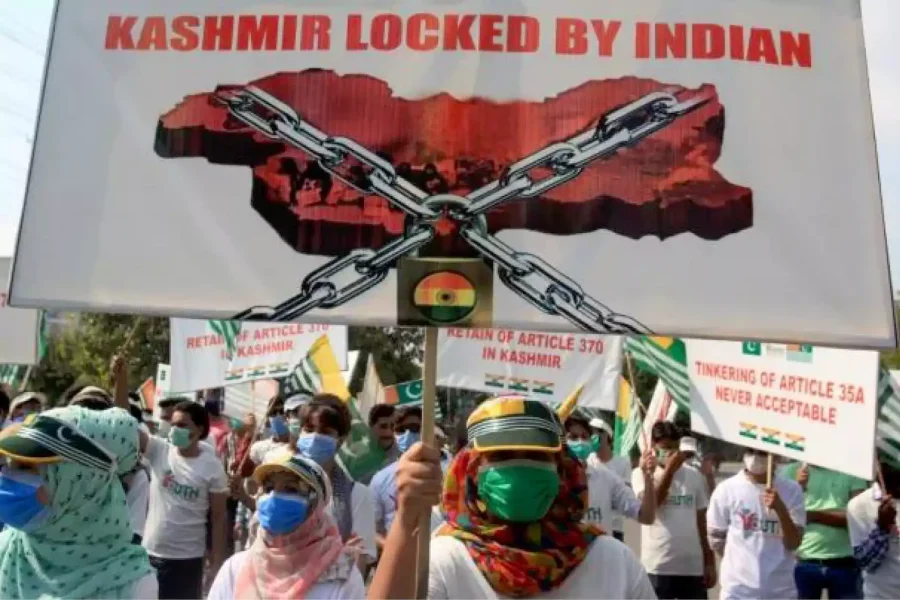Maliha Mughal
Kashmir has been a contentious subject between India and Pakistan since they gained independence in 1947. In a quest to govern the disputed land, which is divided between the two nations, they have engaged in several wars.
However, in August 2019, the Modi administration unilaterally intervened against the territory, removing its long-standing autonomy, and dividing it into two regions under the jurisdiction of the central government to make up for a promise it had made to its rightwing constituency. The government of the territory was dissolved, local politicians were detained, and the longest internet blackout in history i.e about 18 months was enacted. All these events involved the deployment of thousands of troops into the occupied territory.
Kashmir has long been the target of malicious Indian government plans. Modi asserted that normality has returned to Kashmir after rescinding Article 370. On October 10, 2022, Indian Prime Minister Narendra Modi claimed that he had been successful in settling the Kashmir dispute while speaking at a rally in Gujarat’s Anand district. His comment about the “settled Kashmir problem” demonstrates how ignorant the Indian leadership is of the ground realities.
Pakistan, on the other hand, categorically rejected the claims made by Modi and said that the Indian leadership must fulfill its obligations to Kashmiris and the international community by ensuring that the people of Kashmir are granted their unalienable right to self-determination rather than making irrational claims that the conflict has been resolved unilaterally.
Rajnath Singh, the Indian Defensc Minister, expressed his desire for Gilgit-Baltistan to become a part of India at an event in Budgam on October 27, 2022, hoping to finish the mission the Modi administration started by annexing occupied Kashmir in August 2019. However, Pakistan’s Foreign Office denounced it as an unwarranted and inappropriate statement.
In November, the commander of the Northern Army, Lt. Gen. Upendra Dwivedi, declared that the Indian Army was prepared to carry out instructions like reclaiming Pakistan-occupied Kashmir. Moreover, he asserted that the Indian Army is prepared to obey any directives issued by the Indian government.
Inter Services Public Relations (ISPR) denied the Indian Army’s “fallacious claims” of annexing Azad Jammu and Kashmir. Also, the high-ranking Indian army officer’s unjustified comment is a perfect example of the deluded thinking of the Indian armed forces and demonstrates the distinct influence of domestic political theatrics on the Indian military mindset.
On December 3, 2022, the Chief of Army Staff (COAS), Syed Asim Munir, paid a visit to frontline soldiers in Rakhchikri Sector of the Line of Control (LoC). In a bid to intimidate India, he adopted an aggressive approach. He claimed that recent remarks made by the Indian government against G-B and AJK were extremely reckless. He unequivocally stated that should war ever be declared against us, Pakistan’s military forces will be prepared to not only defend every square inch of our nation but also to retake the battlefield.
India is only attempting to deflect attention from the oppressive use of force and flagrant human rights abuses by the Indian army against innocent, defenceless Kashmiris who are fighting for their right to self-determination.
In IIOK, democracy is still elusive. After August 2019, the administration of the territory was never reinstated, and there haven’t been any regional elections for nearly five years, thus Kashmiris have no political representation or means of airing their grievances.
In terms of the Pakistani Army, it is a positive force that promotes stability and peace in the region. Pakistan has repeatedly warned that its desire for peace is matched by its capabilities and willingness to “nullify any misadventure or assault on our land,” a claim that has been thoroughly proven several times, most recently in the Balakot incident. Any misunderstanding that leads to a mishap will always be handled with the full might of the military forces, supported by a strong country. The Indian state will never be able to carry out its evil plans. According to UN resolutions, the international community must provide justice and fulfill its promises to the Kashmiri people.
Although India wishes to avoid international engagement, it is important to address Kashmir’s human rights issues since doing so is the first step in breaking the cycle of violence. The government is reactivating civilian militias in the unstable Jammu area of Kashmir, exposing the limitations of its military strategy there. It is bizarre that in the world’s most militarized zone, you need to equip people to safeguard the residents, which surely is the army’s role. In many ways, it contradicts itself.
The Indian military would be wise to refrain from using reckless hyperbole and hostility to endorse the regressive ideology of their political elite on the campaign trail to promote peace in the region. The international community needs to play an active role in resolving the Kashmir conflict. Instead of military occupation, Kashmiris need the right to self-determination.










